A quick win
All the results from round 10:
| Ian Nepomniachtchi |
1 - 0 |
Kirill Alekseenko |
| Wang Hao |
½-½ |
Alexander Grischuk |
| Fabiano Caruana |
½-½ |
Ding Liren |
| Maxime Vachier-Lagrave |
½-½ |
Anish Giri |
Round 11 will take place on Friday, April 23 at 4:00 p.m. local time. Pairings:
| Ian Nepomniachtchi |
v |
Fabiano Caruana |
| Kirill Alekseenko |
v |
Wang Hao |
| Alexander Grischuk |
v |
Maxime Vachier-Lagrave |
| Anish Giri |
v |
Ding Liren |
The one decisive game of round 10 finished surprisingly quickly and had a massive effect on the fight to become Magnus Carlsen’s next challenger. Ian Nepomniachtchi needed only 31 moves to defeat Kirill Alekseenko after the latter misplayed the opening. With four rounds to go, Nepo is now a full point ahead of the trio made up by Fabiano Caruana, Anish Giri and Maxime Vachier-Lagrave.
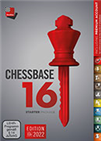 Your key to fresh ideas, precise analyses and targeted training!
Your key to fresh ideas, precise analyses and targeted training!Notably, the leader has faced all three of the chasers with the black pieces — in fact, he has already played Giri twice, scoring a win and a draw. On Friday, after the rest day, the Russian will play Caruana; on Saturday, he will have black against Wang; and, after another rest day, he will play white against Vachier-Lagrave — i.e. Nepo will get a free day to prepare for the two key encounters remaining.
With so much at stake, we expect the chasers to go all-in against the leader, while nerves might also play a big role now that Nepo probably feels his fate is in his own hands.
Regarding a potential tie for first, things do not look good for Giri, since the head-to-head score is the first tiebreak criterion, and he has already lost against the leader. MVL, on the other hand, beat Nepomniachtchi in round 7, while Caruana would actually become the favourite to take it all if he defeats the Russian on Friday since they drew their first encounter.
Nothing is yet decided, though. As we have witnessed in the past, strange things can happen when the stakes are so high.

The playing hall in Yekaterinburg | Photo: Lennart Ootes
Nepomniachtchi 1 - 0 Alekseenko
Very rarely we see a player as strong as Alekseenko getting in trouble strategically as quickly as he did on Wednesday. Nepo played the English Opening and went for a Catalan-like structure. Alekseenko simply could not address the main problem Black has in these positions: the activation of the light-squared bishop.
By this point, Carlsen was already talking about how Alekseenko needed to show something specific to justify his play so far, since there are lines that have been proven to be much less problematic for black. Moreover, Alekseenko had been spending over three minutes on almost every decision since move 4.
Black did not have a surprise in store. The game continued 8...Be7 (8...Qc7 was called for, planning a quick ...b6 and ...Bb7) 9.0-0 0-0 10.d4 cxd4 11.Nxd4 Qc7 12.Rd1 Rd8 13.Be3 Nb6 14.Rac1
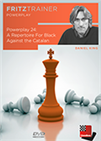 On this DVD Grandmaster Daniel King offers you a repertoire for Black against the Catalan, based around maintaining the rock of a pawn on d5. Keeping central control ultimately gives Black good chances to launch an attack against the enemy king.
On this DVD Grandmaster Daniel King offers you a repertoire for Black against the Catalan, based around maintaining the rock of a pawn on d5. Keeping central control ultimately gives Black good chances to launch an attack against the enemy king.
This position might seem harmless at first sight, but Black is already in deep trouble with his queen unable to find a safe spot away from potential discovered attacks by the rooks and the minor pieces — especially the light-squared bishop — awkwardly placed on passive squares.
Alekseenko, already way behind on the clock, opted for the anti-positional 14...e5, which was duly responded by 15.Nf5 Bxf5 16.Qxf5
Black got rid of the passive bishop, but now White has a great initiative. Nepomniachtchi’s conversion was exemplary, cleanly showcasing the weaknesses of his opponent’s plan. White gave up his dark-squared bishop for the f6-knight after 16...Nc4 17.Bg5 Rxd1+ 18.Nxd1 Rd8
Grandmaster Karsten Müller analysed the second phase of the game, explaining why Nepo chose to enter an opposite-coloured bishops position. The sole leader wreaked havoc on Alekseenko’s position along the light squares.

Things looked bad for Kirill Alekseenko right out of the opening | Photo: Lennart Ootes
Wang ½ - ½ Grischuk
In round 9, we mentioned how it was surprising to see Alexander Grischuk getting a considerable edge on the clock. The very next day, however, the time-trouble addict returned to his old habits. Grischuk spent no less than 72 minutes reflecting on how to play his 11th move!
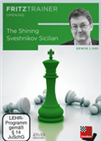 Always wanted to play like a World Champion? Search no further! With Magnus Carlsen using the Sveshnikov variation as his weapon of choice in the World Championship match against Fabiano Caruana, this DVD could not be better timed.
Always wanted to play like a World Champion? Search no further! With Magnus Carlsen using the Sveshnikov variation as his weapon of choice in the World Championship match against Fabiano Caruana, this DVD could not be better timed.
Indeed, it is a tense position, which has been seen in games featuring Alexander Morozevich (draw) and Ding Liren (won) playing the black pieces. Grischuk finally went for 11...cxd4 and a number of trades in the centre led to another crucial position. This time around, it was Wang who surprised the commentators with his decision.
The Chinese sacrificed his queen for two pieces and two pawns with 21.exf6 Bxc2 22.fxe7 Rfe8 23.Nf4 Nb6 24.Nxd5.
At this point, both the engines and Grischuk consider that Black had a considerable advantage, but it is not at all simple to find the most precise moves, as White can create threats against the king with his bishop pair. In the end, an intricate skirmish finished drawn in 41 moves.
Asked about how the 72-minute think had impacted the game, Grischuk responded:
I think it impacted in two ways. One is good for me, as it made my opponent sacrifice a queen probably not very correctly; but, on the other hand, it made me unable to really think after the unexpected 12.Nfxd4.
If you want to see what kind of lines Grischuk was considering, do check out the 18-minute post-game press conference. Classical chess is hard!

Time-trouble addict Alexander Grischuk | Photo: Lennart Ootes
Vachier-Lagrave ½ - ½ Giri
Playing black, Giri again chose the Sveshnikov Variation of the Sicilian he had used to draw Nepomniachtchi in round 8. Vachier-Lagrave played the line with 7.Nd5, which had been explored at the 2018 World Championship match in London. MVL deviated from the most popular continuations on move 10 and put some pressure on his opponent.
The Frenchman eventually gained a pawn.
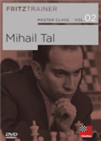 On this DVD Dorian Rogozenco, Mihail Marin, Oliver Reeh and Karsten Müller present the 8. World Chess Champion in video lessons: his openings, his understanding of chess strategy, his artful endgame play, and finally his immortal combinations.
On this DVD Dorian Rogozenco, Mihail Marin, Oliver Reeh and Karsten Müller present the 8. World Chess Champion in video lessons: his openings, his understanding of chess strategy, his artful endgame play, and finally his immortal combinations.
The d6-pawn looks scary, but it is not easy to push it in a position with opposite-coloured bishops on the board. Giri showed the correct way to defend and a draw was eventually signed.
In the press conference, the players concluded:
Vachier-Lagrave: It’s a bit disappointing because I had a very good position, but at the same time there is nothing obvious that I missed.
Giri: Yeah, and you faced a great defence.
Vachier-Lagrave: The draw master is back at it (smiles).

Anish Giri | Photo: Lennart Ootes
Caruana ½ - ½ Ding
World’s numbers 2 and 3 played an interesting line out of a Spanish Opening, with Ding getting things fully under control by move 17.
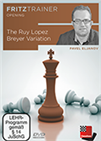 Pavel Eljanov explains in depth what Gyula Breyer already saw in 1911 and what became an opening choice of the likes of Kasparov, Kramnik, Anand or Carlsen. The Breyer Variation, which is characterised by the knight retreat to b8.
Pavel Eljanov explains in depth what Gyula Breyer already saw in 1911 and what became an opening choice of the likes of Kasparov, Kramnik, Anand or Carlsen. The Breyer Variation, which is characterised by the knight retreat to b8.
Ding later commented that he was proud for having figured out that his queen was well-placed on c8, while here, after 17...Nxa5 18.Qc2, Caruana already thought there was no way to play for a win with white.
The Chinese star kept putting pressure, but Caruana’s excellent calculation abilities allowed him to hold a draw.

The ever candid Ding Liren | Photo: Lennart Ootes
Standings after Round 10
All games
Links
























